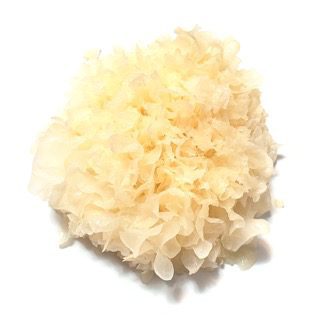

Snow Fungus, also known as Tremella, is a type of mushroom that can be beneficial for dogs. It has anti-cancer and immune-boosting properties, is rich in vitamin D, and aids in digestion due to its high fiber content. This mushroom is native to China but is now widely available in many countries.
Snow fungus has numerous benefits for dogs. It can help restore dry skin by generating a hydration film and producing gelatinous basidiocarps that boost skin hydration. Additionally, it has anti-cancer and immune-boosting properties, enhances the body’s anti-tumor immunity, and improves liver function. Snow fungus is also rich in vitamin D, which promotes cell growth and wound healing, and is a good source of fiber that promotes healthy digestion.
While snow fungus is generally safe for dogs, excessive consumption can lead to internal bleeding. Additionally, low-quality dry snow fungus may contain residual sulfur dioxide, which can cause bronchospasm and cancer in dogs with long-term consumption.
Before cooking, dried snow fungus should be soaked in enough water until it doubles in size and turns semi-transparent. Wash and trim any hard parts on the underside of the mushroom. Boil the snow fungus until the water thickens. If there is a suspicion of residual sulfur dioxide, soak the fungus for 3 to 4 hours, changing the water every hour. Cut the tremella into small pieces and give it to your dog in moderation. It is important to note that the medicinal effect of tremella is slow and requires long-term consumption to be effective. Always consult with a veterinarian before using any plant medicinally for your dog.
While snow fungus, also known as Tremella, can be fed to dogs, it is important to be aware of its potential side effects. Excessive consumption of this mushroom can lead to internal bleeding, so it should only be given to dogs occasionally and in moderation.
However, excessive consumption of snow fungus can lead to internal bleeding, so it should only be given to dogs occasionally and in moderation. Low-quality dry snow fungus may also contain residual sulfur dioxide, which can cause bronchospasm and cancer in dogs with prolonged consumption.
Although snow fungus may be affordable and easily accessible, it is important to make sure the fungus has been properly processed before feeding it to your pet. Soak the dried fungus in water until it doubles in size and becomes semi-transparent. After boiling the fungus, cut it into small pieces to give to your dog in moderation.
Two alternatives to snow fungus that are safe for dogs include broccoli and carrots. Broccoli is a good source of fiber and vitamins, while carrots are rich in beta-carotene and promote healthy teeth and gums.
Have you ever fed your dog snow fungus or any other type of mushroom? It is always important to consult with a veterinarian before using any plant medicinally for your dog. Remember, a healthy and balanced diet is key to your pet's wellbeing.